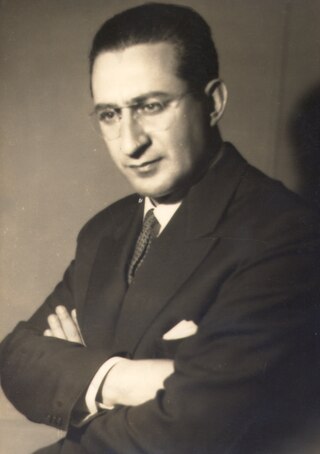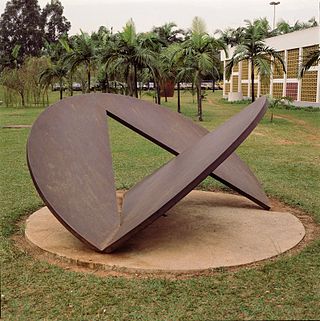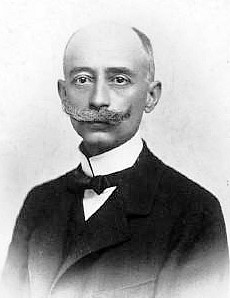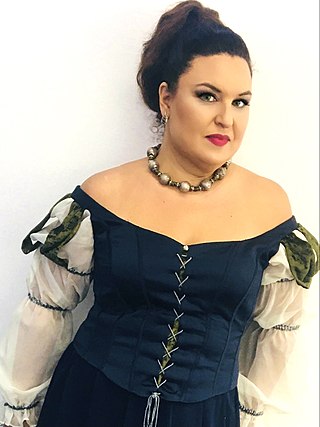This article includes a list of general references, but it lacks sufficient corresponding inline citations .(June 2010) |
Ernst Mahle (born 3 January 1929) [1] is a Brazilian composer and orchestra conductor of German birth.
This article includes a list of general references, but it lacks sufficient corresponding inline citations .(June 2010) |
Ernst Mahle (born 3 January 1929) [1] is a Brazilian composer and orchestra conductor of German birth.
Mahle was born in Stuttgart, Germany. He studied music with Johann Nepomuk David in Stuttgart before coming to Brazil in 1951, and then with Hans-Joachim Koellreutter in Piracicaba. He became a Brazilian citizen in 1962. In 1953 he was one of the founders of the Escola de Música de Piracicaba. After teaching music there, he became artistic director and conductor of the orchestra and choir of the institute, holding these posts for more than fifty years.
In 2005, Mahle composed the opera O Garatuja , [2] libretto by Eugênio Leandro. The opera was based on the homonymous novel by José de Alencar, which was premiered on 27 April 2006, at the Teatro Municipal de Piracicaba "Dr Losso Netto". He is a member of the Brazilian Academy of Music (chair no. 6).

The music of Brazil encompasses various regional musical styles influenced by European, American, African and Amerindian forms. Brazilian music developed some unique and original styles such as forró, repente, coco de roda, axé, sertanejo, samba, bossa nova, MPB, gaucho music, pagode, tropicália, choro, maracatu, embolada, frevo, brega, modinha and Brazilian versions of foreign musical styles, such as rock, pop music, soul, hip-hop, disco music, country music, ambient, industrial and psychedelic music, rap, classical music, fado, and gospel.

Alberto Nepomuceno was a Brazilian composer and conductor.

Mozart Camargo Guarnieri was a Brazilian composer.
Jorge Manuel Marques Peixinho Rosado was a Portuguese composer, pianist and conductor.
O Garatuja is an opera composed by Ernst Mahle in 2005, with libretto written by Eugênio Leandro. The opera is based on the homonymous novel by José de Alencar (1873) and premiered in Piracicaba at the Teatro Municipal "Dr Losso Netto" on 27 April 2006.
José Joaquim Emerico Lobo de Mesquita was a Brazilian composer, music teacher, conductor and organist.

Amílcar Augusto Pereira de Castro was a Brazilian artist, sculptor and graphic designer.

Fabio Costa is a Brazilian-born composer, conductor and pianist. He is also active as a composer of microtonal music.
Ilza Nogueira is a Brazilian composer, music educator and musicologist with specialty in the area of music analysis.

Marcela Rodríguez is a Mexican composer.
Maria Clotilde Belo de Carvalho Rosa Franco, known as Clotilde Rosa, was a Portuguese harpist, pedagogue and composer.
Flausino Rodrigues Valle, better known as Flausino Vale was a Brazilian violinist/composer. Although he was a lawyer, he was a major researcher on Brazilian folk music. He was professor of History of Music at the Conservatório Mineiro de Música. Like Paganini, he had composed an album of 26 Preludes for solo violin in a Brazilian landscape style.
Luís Tinoco is a Portuguese composer who has achieved renown for works including the operas Evil Machines (2008) and Paint Me (2010), and the cantata Wanderings of the Solitary Dreamer (2011). He was born in Portugal on 16 July 1969.

Events in the year 1903 in Brazil.

Chôros No. 2 is a duet for flute and clarinet written in 1924 by the Brazilian composer Heitor Villa-Lobos. It is part of a series of fourteen numbered compositions collectively titled Chôros, ranging from solos for guitar and for piano up to works scored for soloist or chorus with orchestra or multiple orchestras. and in duration up to over an hour. Chôros No. 2 is the shortest in the series, a performance lasting only about two-and-a-half minutes.

Chôros No. 7, subtitled "Settimino" (Septet), is an instrumental septet written in 1924 by the Brazilian composer Heitor Villa-Lobos. It is part of a series of fourteen numbered compositions collectively titled Chôros, ranging from solos for guitar and for piano up to works scored for soloist or chorus with orchestra or multiple orchestras, and in duration up to over an hour. Chôros No. 7 is of modest length, a performance lasting about eight-and-a-half minutes.

Le fate is an opera in 2 acts by Henrique Oswald to an Italian libretto by Eduardo Filippi. It is the last of Oswald's three operas, composed in 1902–1903. It is known of no performances of this work. It remains unpublished.

José Joaquim dos Santos was a Portuguese music teacher and late Baroque-period composer who specialised in writing sacred music. He was listed by two authors as being among Portugal's "most outstanding eighteenth-century composers."

Lady Chuquer Volla Borelli de Bourbon, also known as Lady Francisco, was a Brazilian actress and director. She appeared in 25 films and several TV soaps.

Kismara de Lourdes Pessatti, known as Kismara Pezzati and Kismara Pessatti, is a Brazilian mezzo-soprano naturalized in Switzerland. Previously known for performances in operas and concerts primarily as a contralto, she has recently expanded her repertoire to dramatic mezzo-soprano.
Brazilian composer Ernst Mahle in 1929 (age 90)